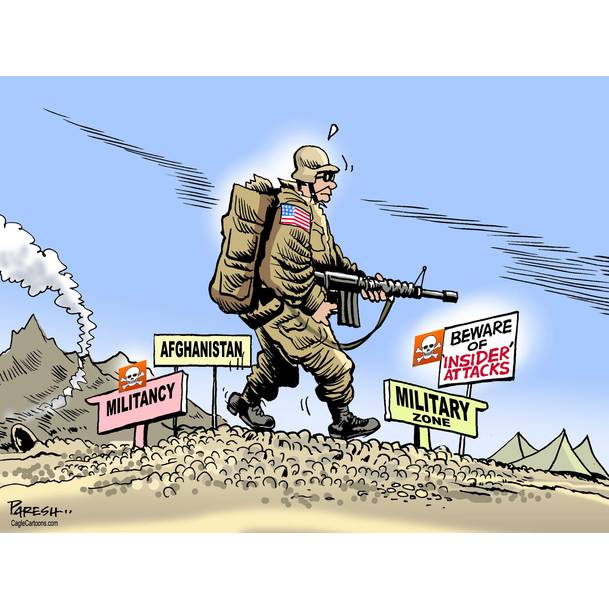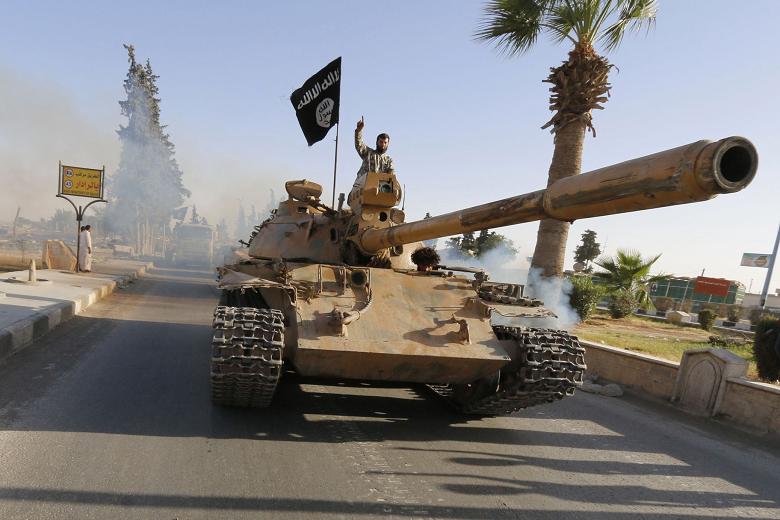Increased incidence of green on blue attacks latest evidence that NATO’s best before date in Afghanistan is well past due.
Even with the war well into its second decade, tensions are high between NATO and the new Afghanistan government. With the war a continued drain on the economies of the participating countries, not to mention its continued unpopularity NATO countries are eager to put an end to the war as soon as possible. Finally reacting to the growing public unrest, U.S. President Barack Obama announced earlier this month that 34, 000 U.S. troops would be pulled out of Afghanistan in the next year and vowed that by the end of 2014 the U.S. led war would be over. The move halves the size of the current 66, 000 soldiers stationed in the Asian country. Afghan forces are planning to take control of their own security beginning this spring while NATO will withdraw from leading combat operations in the next two years and serve in an advisory and supporting role.
While the move to withdraw troops was welcome news for many in the U.S., the announcement drew mixed reactions in Afghanistan. The Afghan government welcomed the news, saying its forces are ready to assume control of the country’s security, but many civilians worry that a quick drawdown will destabilize an already volatile situation. Forces are still battling insurgents on the ground and there are fears among the population that the nearly 352, 000 member Afghan army and police forces are not yet ready to take full control. The memory of the civil war following the Soviet withdrawal in 1989 still lingers in the minds of many citizens and there is a fear of history repeating itself.
Along with the news of the troop withdrawal, hostilities between the two sides were also intensified earlier this month due to NATO airstrikes that killed ten civilians in eastern Afghanistan. The deaths, five of which were children, occurred in the Shigal district of Kunar province. The attacks were condemned by Afghan President Hamid Karzai’s who stated that air strikes on Afghan villages were not the solution to fighting terrorism. In October, Karzai criticized NATO forces for trying to fight the war in Afghan villages when they should be pursuing those in Pakistan who support terrorism.
A Rise in “Green on Blue Attacks”
While all of these are valid reasons why NATO should leave Afghanistan, the increased incidence of “green on blue attacks” should serve as the final straw for NATO decision makers. “Green on blue attacks” is the term that has been coined for incidents where Afghan soldiers turn their weapons on their foreign mentors and trainers. The bulk of the training and mentoring is carried out by British and American forces based in Helmand and Kandahar. These also happen to be the two deadliest provinces where the Taliban are strongest. Such attacks have been ongoing for many years, but they became more frequent beginning in 2011 right around the time the U.S. committed to ending combat operations in 2014. In 2012, there were fifty green on blue attacks, resulting in the deaths of 81 government personnel from six countries. This is a troubling increase from 2011 when 21 attacks were carried out against the International Security Assistance Force resulting in 35 deaths. Of the fifty attacks in 2012, 23 have been attributed to members of the Afghan National Army, 22 to the Afghan National Police and three have been attributed to the Afghan Local Police. Armed assaults were the most prevalent attack types in 2012, while there were two occurrences of suicide bombings. One of the most disturbing incidents occurred last August when a newly sworn-in local police officer was handed his official AK-47 firearm at his graduation ceremony and immediately began firing, killing two American mentors.
The climb in green on blue attacks has further deteriorated an already fragile situation in Afghanistan. The primary effect of the assaults has been that relations between NATO personnel and their Afghan colleagues have worsened. Insider attacks have undermined trust and confidence, as many trainers are now carrying personal firearms whenever they interact with Afghan personnel “just in case.” Both NATO and the Afghan government have continued to maintain that these attacks are largely a clash of cultures. It is claimed that Afghan soldiers are angered by a perception of Western decadence and lack of respect or are angered at carrying out orders from foreign mentors which causes them to “snap.”
Many observers believe that green on blue attacks will continue to increase in 2013. If there was ever an additional reason that NATO required to justify departing Afghanistan as soon as possible, it is the escalation of these incidents. It has been well over a decade since this war has begun and NATO involvement should have been winding down much sooner than it is now. NATO has nothing to gain and much more to lose by prolonging its stay in the troubled country. Responding to the increase in green on blue killings, NATO secretary-general Anders Fogh Rasmussen said this past fall that the attacks have sapped morale and a retreat of Western forces could come sooner than expected. Decision-makers should be doing all that they can to end the war by the end of 2013. The time has come for NATO to make the right decision rather than risk many more lives lost in a war already well past its due date.




